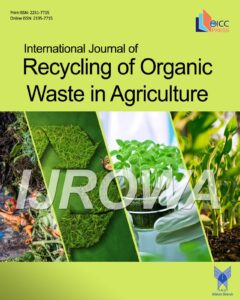Characteristics of co-composts produced from raw faecal sludge and organic market waste in Osun state, southwest Nigeria
Authors
-
Olufemi O Aluko
 1
1
-
Elizabeth O Oloruntoba
 1
1
-
Godson R.E.E Ana
 1
1
-
Taiwo B Hammed
 2
2
- 3, 4, 5, 6
Abstract
Purpose Faecal sludge (FS) and organic market waste (MW) have resources that could be recovered by co-composting though not fully explored under changing climatic conditions in Nigeria. This study explored the characteristics and nutrient quality of co-composts produced from pre-treated FS and MW feedstocks in Nigeria.
Methods The study was exploratory and analytical in design and co-composting was purposively selected for resource-recovery. The raw faecal sludge (FS) was harvested from septic tanks of households (50%) and institutions (50%) through mechanical evacuation service trucks and dewatered using 0.1% gradient sand filter. The biodegradable MW was sorted and used for further studies. The dewatered FS (DFS) and MW were mixed in ratios 1:3, 1:5 and 1:7, respectively with DFS and MW as controls. Each of the mixes was made into 1m3 heap and co-composted using the windrow method. The experiments were monitored for 88 days with fortnight composite sampling from each mix (13-weeks). The samples were analyzed for temperature, pH, moisture-contents, micronutrients, macronutrients and pollutants using Standard Methods.
Results At maturity, N:P:K (%) indicate good composts at 9: 5: 4, 18: 7: 19 and 3: 3: 1 in the 1: 3, 1: 5 and 1: 7 mixes, respectively, while those of controls were: 19:12:12 (DFS) and 17:14:11(MW) with no significant differences between experimental and control mixes. Also, four factors extracted (pollutants, agronomic, macronutrients and micronutrients), explained 78.2% variability.
Conclusion The matured co-compost satisfied nutrients and pollutants quality for agricultural use, recovered organic fertiliser from raw domestic and institutional faecal sludge and market waste.



